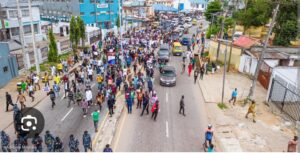

By Dada Ahmed.

Ordinarily, Thursday, August 1, would have been a day for Nigerians to thank the Almighty God for the chance to witness the beginning of the eighth month of the year, honoring the memory of those who have passed on. Social media would have been filled with New Month greetings, prayers for God’s mercy and protection, and hopes for health and positive developments for the rest of 2024 and beyond. Instead, August 1 became a day marked by nationwide protests with devastating consequences for the nation.
On August 1, 2024, Nigeria saw a massive surge in public dissent as citizens nationwide took to the streets for the #EndBadGovernance protests.
This movement, led by a decentralized but rapidly growing group, emerged in response to widespread frustration over hunger and a multitude of severe economic challenges affecting the country.
Protesters expressed their discontent, emphasizing the need for the government to tackle corruption. They also criticized the administration’s handling of the economy, noting rising inflation and unemployment rates that have left many Nigerians struggling to survive.
The protests were notable for their scale and intensity, with demonstrations held in major cities such as Lagos, Abuja, Port Harcourt, and numerous other states.
Participants carried placards with slogans demanding accountability and transparency, and the streets were filled with chants calling for systemic change.
However, the first day of the protests also led to turmoil. Despite hopes for a peaceful demonstration, media reports indicate clashes between protesters and security forces in some areas, resulting in loss of lives and damage to property worth billions of naira, including the destruction of the Nigeria Communication Commission (NCC) office in Kano. This ugly development led to the imposition of a 24-hour curfew in Kano by the state government.
As the nation grieves the loss of lives and the destruction of property, experts,who spoke through various social media platforms, especially AI language model developed by OpenAI, urge the Tinubu administration to intensify efforts to address the country’s economic crisis and ensure effective governance, for peace, and meaningful development.
To address the #EndBadGovernance protests and improve Nigeria’s economy, experts suggest that President Bola Ahmed Tinubu’s government focus on several key areas:
1. Strengthening Anti-Corruption Measures: Implement more stringent checks and balances and ensure accountability for officials at all levels.
2. Economic Reforms: Pursue comprehensive economic reforms aimed at diversification, reducing reliance on oil, improving infrastructure, and creating a more business-friendly environment.
3.Improving Governance: Enhance transparency and efficiency by adopting increased best practices, improving public sector management, and implementing systems to manage public funds effectively.
4.Addressing Security Concerns: Strengthen the capacity and effectiveness of security agencies to tackle issues affecting daily life and economic stability, including insurgencies and banditry.
5. Increasing Public Engagement: Foster better communication with the public to rebuild trust. Engage with civil society, listen to their concerns, and address grievances to demonstrate a commitment to reform.
6. Expanding Social Programs: Invest in poverty reduction, education, and healthcare to improve living standards and support economic stability.
7. Legal and Institutional Reforms: Reform legal and institutional frameworks to ensure justice, protect property rights, and enhance the business climate of the country.
In a report by This This Day newspaper,from Abuja,Governance and Strategic Management expert, Dr. Leesi Gborogbosi, advised President Bola Tinubu to apply three “strategic steps” conceived by him with assurance to end the lingering #EndbadGovernance protests sweeping across Nigeria.
Gborogbosi, who was reflecting on the worsening consequences of the raging protest on Friday, challenged the President to, “put me to the test, apply these simple measures and watch the protest disappear”.
Shedding more light on the conceived steps, he said, “First, Mr President should make a national broadcast pleading with the protesters to give the government a 30-day grace period.
“Step two, the President should call for a five-day Emergency Economic Crisis (EEC) Meeting and Workshop in Abuja. Invitees to the workshop should include the President, Governors, LG Chairmen, Traditional Rulers, Business Leaders and Representatives of Youth and Women.
“Then, within five days, the gathering should develop an economic and development plan that can solve the problems of hunger, poverty, joblessness, security and foreign exchange, among others.
“And lastly, going forward, President Tinubu should present the outcomes of the five-day workshop to the Nigerian people to ensure buy-in and then implement the outcomes immediately in all LGAs, States and Abuja”.
According to him, the implication is that, “This approach will Renew Hope in Nigerians”.
“In the Kenyan experience, the President refused to talk to the people at the onset, and we all know the outcome of the Kenyan protest.
“Let’s support President Tinubu to succeed by giving him honest feedback. The success of President Tinubu is the success of Nigeria.He further cautioned that, “a leader should periodically drop those in his inner circle who are not adding value.”
Political analysts argue that effectively implementing these measures could help mitigate protests, stabilize the economy, and address demands for good governance and save Nigeria the grip of various social and economic hardships, including hunger, fuel hike and increase in electricity tarrif.
Ahmed publishes The Reporters.
ahmeddada008@gmail.com.

